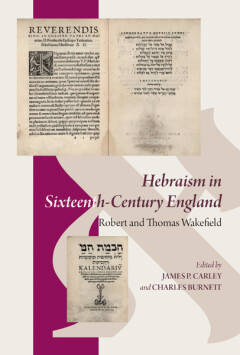
- Retrait gratuit dans votre magasin Club
- 7.000.000 titres dans notre catalogue
- Payer en toute sécurité
- Toujours un magasin près de chez vous
- Retrait gratuit dans votre magasin Club
- 7.000.0000 titres dans notre catalogue
- Payer en toute sécurité
- Toujours un magasin près de chez vous
Description
Robert Wakefield (ca. 1493/5-1537) and his brother Thomas (1500-1575) were pioneers in the study and teaching of Hebrew in early modern England, but the range of their learning and their accomplishments has received scant scholarly attention.
Robert was trained at Cambridge, where he was closely associated with the educational reforms of John Fisher. He claimed to have acquired his expertise in Aramaic, Hebrew, and Arabic through long study of books that had come into his hands rather than from teachers. By the 1520s, however, his erudition combined respectable biblical scholarship with knowledge of later Jewish literature, eventually bringing him professorial status in Louvain and in Cambridge, and later in Oxford.
Thomas, who enjoyed long tenure as praelector in Hebrew at Cambridge, took possession of his brother's books and manuscripts upon his sudden death. Thomas was a compulsive annotator of his books, and through his notes it has been possible to learn a great deal about his intellectual, philological, and theological interests. His marginalia in a copy of the Hebrew Bible he inherited reveal an overwhelming desire to return to the pristine version of the text of scripture, the Hebraica veritas.
This volume draws together the political, linguistic, and bibliographical materials that shaped the careers of these two scholars, often serving to revise previous claims. The essays, while representing important contributions in their own right, also reflect on each other, extending arguments and drawing together thematic conjunctions to produce a compelling analysis of Hebrew learning in sixteenth-century England.
Spécifications
Parties prenantes
- Auteur(s) :
- Editeur:
Contenu
- Nombre de pages :
- 348
- Langue:
- Anglais
- Collection :
Caractéristiques
- EAN:
- 9780888442314
- Date de parution :
- 22-09-23
- Format:
- Livre relié
- Format numérique:
- Genaaid
- Dimensions :
- 156 mm x 234 mm
- Poids :
- 703 g

Les avis
Nous publions uniquement les avis qui respectent les conditions requises. Consultez nos conditions pour les avis.






